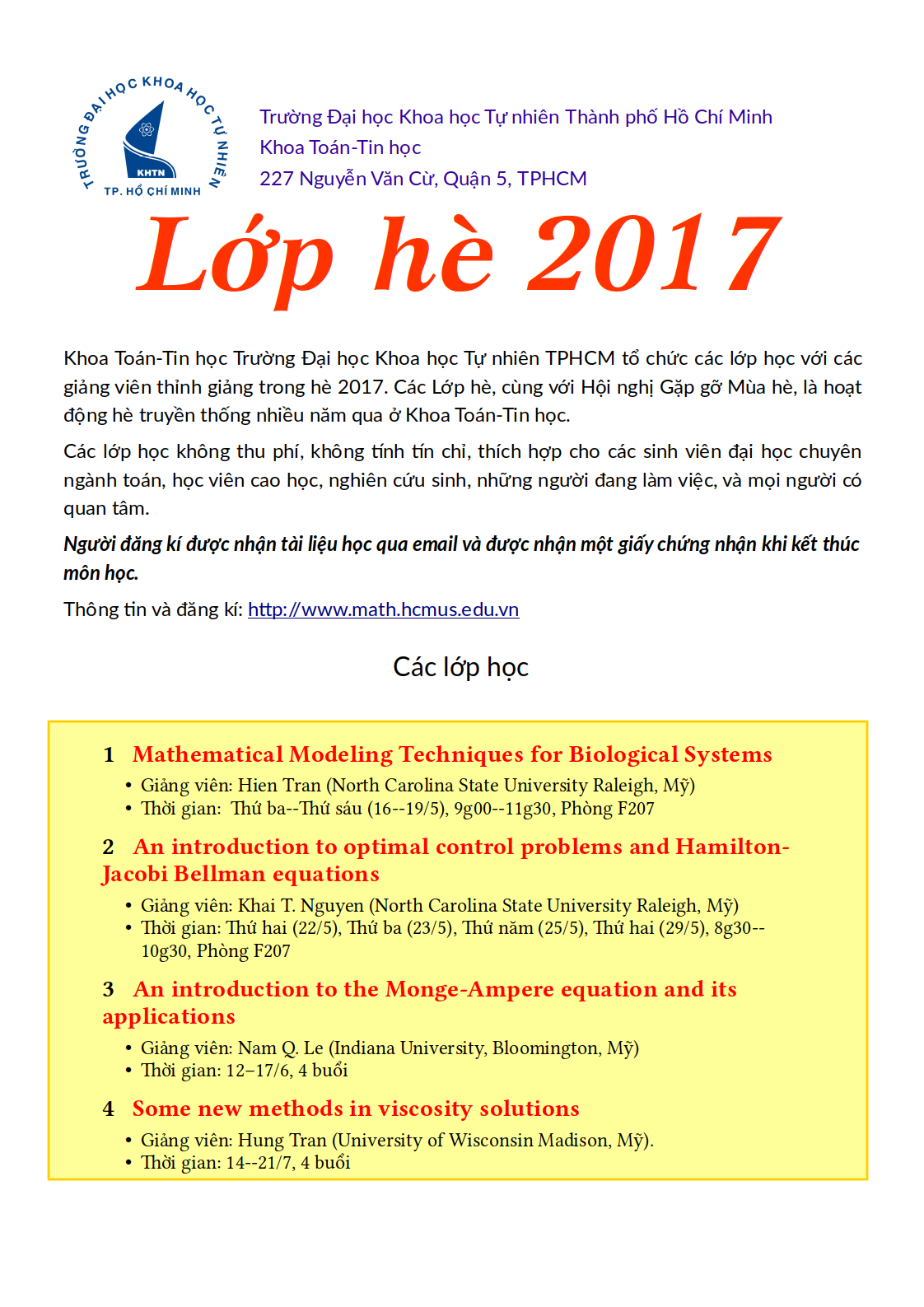
Khoa Toán-Tin học Đại học Khoa học Tự nhiên TPHCM tổ chức các lớp học với các giảng viên thỉnh giảng trong hè 2017. Các Lớp Hè, cùng với Hội nghị Gặp gỡ Mùa hè, là hoạt động hè truyền thống nhiều năm qua ở Khoa Toán-Tin học.
Đối tượng tham dự
Các lớp học không thu phí. Không tính tín chỉ. Các lớp học thích hợp cho các sinh viên đại học chuyên ngành toán, học viên cao học, nghiên cứu sinh, những người đang làm việc, và mọi người có quan tâm.
Người muốn dự cần đăng kí bằng cách điền vào mẫu trực tuyến dưới đây. Người đăng kí được nhận tài liệu học qua email và được nhận một giấy chứng nhận khi kết thúc môn học.
Người muốn dự cần đăng kí bằng cách điền vào mẫu trực tuyến dưới đây. Người đăng kí được nhận tài liệu học qua email và được nhận một giấy chứng nhận khi kết thúc môn học.
Liên hệ
- web: http://www.math.hcmus.edu.vn/index.php?option=com_content&task=view&id=2452
- email: This email address is being protected from spambots. You need JavaScript enabled to view it.
Danh sách các lớp
1 Mathematical Modeling Techniques for Biological Systems
- Giảng viên: Hien Tran (North Carolina State University Raleigh, Mỹ)
- Thời gian: 4 buổi, Tuesday - Friday (May 16 - 19/5), Phòng F207
Lecture: 9:00 - 10:00
Break: 10:00 - 10:30
Lecture: 10:30 - 11:30 - Tóm tắt: This course seeks to provide students with a fundamental understanding of how mathematics and statistics are applied to problems in life sciences. Our approach will be through several “case studies” problems that arise in biological applications. For each case study we will discuss why a model is needed and what goals are to be sought. We will examine the mathematical models both analytically and computationally in order to compare their behavior with that exhibited by the modeled phenomena. Such a comparison can be achieved quantitatively through model verification and validation, which are central to the process of model development and evaluation for all complex systems. Verification is concerned with building the model right. It is utilized in the comparison of the mathematical model to its computer implementation. On the other hand, validation is concerned with building the right model. It is utilized to determine that a model is an accurate representation of the real biological system.
- Course Topics:
- Modeling principles: law of mass action, enzyme kinetics (Michaelis-Menten mechanism)
- Mathematical models: population dynamics (Malthusian, Verhulst-Pearl, Gompertz, Lotka-Volterra), infectious diseases (Hepatitis C, HIV models)
- Forward problems (model verification) vs. inverse problems (model validation)
- Inverse problems: sensitivity analysis, identifiability analysis
- Statistical aspects of inverse problems: uncertainty, nonlinear mixed-effects modeling (if time permits)
- Computational demonstrations in MATLAB: MathWorks SimBiology toolbox
2 An introduction to optimal control problems and Hamilton-Jacobi Bellman equations
- Giảng viên: Khai T. Nguyen (North Carolina State University Raleigh, Mỹ)
- Thời gian: 4 buổi, Thứ hai (22/5), Thứ ba (23/5), Thứ năm (25/5) va Thứ hai (29/5), 8g30--10g30, Phòng F207
- Tóm tắt: This course aims to provide an introduction to control theory and its applications. After a short review on some preliminaries of ordinary differential equations, we will present the basic problems in dynamic optimization, both in finite and infinite time horizon. To this aim, one of the fundamental tools used is Bellman’s Dynamic Programming Principle. We will give both an informal and a rigorous treatment of this topic, deriving from it the celebrated Hamilton-Jacobi- Bellman equation, which provides necessary and sufficient optimality conditions. During all the course, many examples will be given in order to motivate and introduce the main problems, to illustrate and explain the critical parts of the proofs, and to give a flavor of the many fields of application of the theory.
3 An introduction to the Monge-Ampere equation and its applications
- Giảng viên: Nam Q. Le (Indiana University, Bloomington, Mỹ)
- Thời gian: 4 buổi, Thứ ba (13/6) tới Thứ sáu (16/6), 8g30--11g00, Phòng F207
- Tóm tắt: The Monge-Ampere equation appears in many areas and applications including affine geometry, convex geometry, optimal transportation and meteorology. It is a very active area of research.
This course is an introduction to the Monge-Ampere equation and its applications. We hope to provide solid background and motivate interested students entering this research area.
After introducing basic concepts such as normal mapping and Monge-Ampere measure, we will study important properties of the Monge-Ampere measure including: weak continuity and invariance property. We then study the celebrated Aleksandrov's maximum principle, the comparison principle, John's lemma and applications. We will discuss the Dirichlet problem and sections of convex solutions to the Monge-Ampere equation. Finally, we will discuss applications of the Monge-Ampere equation to the isoperimetric inequality in geometry and to the semi-geostrophic equation in meteorology.
4 Some new methods in viscosity solutions
- Giảng viên: Hung Tran (University of Wisconsin Madison, Mỹ).
- Thời gian: T6 (14/7), T2 (17/7), T4 (19/7) và T6 (21/7), 9g--11g, Phòng F207
- Tóm tắt: This is a continuation of Professor Khai Nguyen’s course. I will describe viscosity solutions to Hamilton-Jacobi equations and present some new methods to study properties of the solutions.



